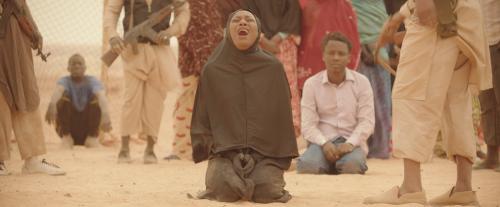
On January 15, the same day that the Academy nominated Mauritanian film Timbuktu for Best Foreign Language Film, satellite photos emerged of the devastation wrought by the Islamist militant group Boko Haram in northern Nigeria. Whole towns were literally wiped off the map, a chilling sign of widespread arson and murder. The timing was eerie: Timbuktu, which debuted at the Cannes Film Festival last May, is based on the real-life 2012 occupation of the titular Malian city by Ansar Dine, a similar jihadist organization. Watching the film, it is difficult, nigh impossible, to separate the images on screen from the violent scenes of religious terrorism we have witnessed over the past few months.

But Timbuktu was never intended to be seen in a vacuum. Abderrahmane Sissako’s sad, handsome film is a response, a supplement, and a protest to the horrors that flash by on the news. For many in West Africa, Islamist extremism is not a sudden, explosive intrusion, but an everyday, almost monotonous burden. Sissako’s film confronts this mundane evil on its own terms, with exacting patience and terrible beauty. It discovers the political outrage and dissent inherent in daily life under draconian rule, unearthing a natural argument for resistance rather than forcing a foreign agenda.
The film’s plot unspools slowly. Sissako gently flits between largely unremarkable scenes of day-to-day life in the city: women selling fish on the street, a young cowherd tending to his cattle, worshippers at a mosque bowed in prayer. What makes the scenes strange and uneasy are the armed men casually patrolling the streets. Occasionally they shout arbitrary rules (no music, no pants of a certain style) in Arabic into a hand-held megaphone. They are foreign jihadists sent to Timbuktu to enforce sharia law. Notably, Sissako observes them as closely and humanely as he does the city’s native residents. They’re almost endearing—one of them is learning how to drive, while another trio passionately debate the merits of the French national soccer team.
For some time Timbuktu does not even appear to have a protagonist. Eventually he emerges out of these pseudo-vignettes: Issan, a musician who lives with his wife and daughter on the town’s outskirts. All of Issan’s neighbors have fled from the jihadists, but either out of stubbornness or fear, he remains. It is Issan who sets the film’s tragic events in motion, making a crucial mistake in a confrontation with a local fisherman. But even in this moment of narrative incitement, Sissako remains resolutely measured, eschewing mainstream filmmaking tropes of enhanced suspense (a manipulative score, urgent editing). Instead, Sissako takes a stoic, big-picture approach with a vast, landscape-wide shot of the aftermath of Issan’s fight with the fisherman: The pettiness of human violence is exacerbated against the backdrop of nature.
Is the Foreign Film Oscar Corrupt and Pointless?
Sissako understands there’s something political in this sense of proportion. The jihadists’ oppression lies in their outlandish punishments for simple, quotidian acts: a brutal lashing for daring to sing, death by stoning for an unmarried man and woman found together in the same room. By scrutinizing the most minute details of people’s lives, these men run the city’s inhabitants ragged, hoping to eliminate any sense of resistance.
Again, Sissako marks this point with an impressive sense of formal sophistication. The film opens with an image of an antelope desperately scampering away from a spray of gunfire as a jeep full of militants “playfully” chase it down. The scene vividly recalls the famous rabbit-hunting sequence from Jean Renoir’s The Rules of the Game (1939), and its symbolism is much the same: Innocent victims are overwhelmed and powerless against the crossfire of a trigger-happy ruling class. The European aristocracy of the early twentieth century has been replaced by a new breed of tormenters. Their weapons are more sophisticated, their flags a different color, their rhetoric adjusted, but the casual disregard and manipulation of human life remains the same.
The Oscar-Nominated Film Hollywood Loves, But the Russian Government Hates
It would be easy to assume from all this that Timbuktu is relentlessly despairing or even pessimistic. It is all the more stunning, and intriguing, that Sissako still takes the time for moments of sensual pleasure and joy amid the city’s affliction. There’s a danger that Sissako’s alluring visuals (captured with rare ability by cinematographer Sofian El Fani) could be seen as venerating suffering, but the director astutely avoids this risk, finding a nobility in the endurance of Timbuktu’s civilians that goes beyond aesthetics.
In possibly the film’s most affecting moment, a group of young men and boys, banned by the authorities from playing with a soccer ball, proceed to act out a pantomime of a game: running, kicking, and spinning a ball that exists entirely in their collective imagination. The surreal visual beauty of the sequence is matched by the bald-faced defiance on display: a refusal to succumb to their arbitrary oppressors.
Such focus on the politics of everyday life in Africa is largely absent from American theaters. It is perhaps not shocking that Timbuktu is only the third film from sub-Saharan Africa ever nominated at the Oscars—and the first to be directed by a black, African-born filmmaker. The perspective presented here is almost entirely alien to the American experience with religious extremism, where terrorism for the greatest part stands as a looming threat, rather than a ubiquitous presence. In a world where the peril of violence and death is everywhere, survival itself becomes a costly, but necessary act of protest: The best and perhaps only weapon being to outlive and outlast.
FRENCH VERSION

Written by : Ethan Gates


